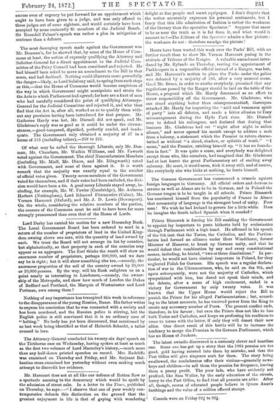Prince Bismarck is forcing his Bill enabling the Government to
appoint lay inspectors to posts hitherto held by ecclesiastics through Parliament with a high hand. He affirmed in his speech of the 9th inst. that the Tories, the Catholics, and the Partial- lariats had formed an alliance under Herr Windthorst, former Minister of Hanover, to break up German unity, and that he would defeat that combination by any and every constitutional means, including, he hinted, "two or three dissolutions." In par- ticular, he would not have clerical inspectors in Poland, for they neglected Polish for German. His speech was a regular declara- tion of war to the Ultramontanes, who, he said on the 9th, and again subsequently, were not the majority of Catholics, which sympathized with him, but dared not speak their minds, and the debate, after a scene of high excitement, ended in a victory for Government by only twenty votes. It was known that the Upper House would reject the Bill to punish the Prince for his alleged Parliamentarism ; but, accord- ing to the latest accounts, he has received power from the King to create any necessary number of Peers. The present conflict ends, therefore, in his favour ; but even the Prince does not like to lose both Tories and Catholics, and keeps on professing his readiness to come to terms with the latter, if only they will desert their new allies. One direct result of this battle will be to increase the tendency to merge the Prussian in the German Parliament, which has no House of Junkers.


































 Previous page
Previous page